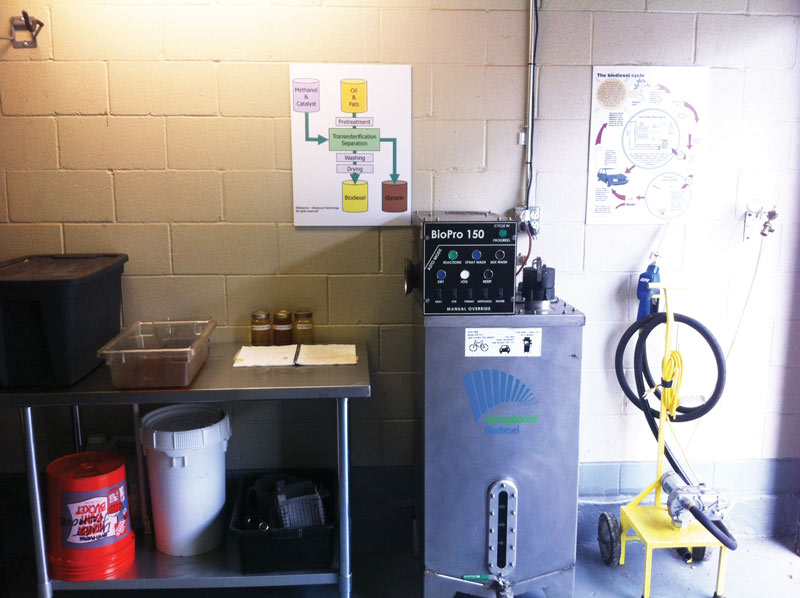
The BioPro 150 biodiesel processor turns waste cooking oil into fuel for the maintenance equipment at Tierra Verde Golf Club in Arlington, Texas. Photo courtesy of Mark Claburn
The french fries, homemade potato chips and other fried fare served at Ventana Grille in Arlington, Texas, share an uncommon connection to the 18-hole, 250-acre public golf course that sweeps out beyond the restaurant’s south-facing windows. That course is Tierra Verde Golf Club, and since March 2012, all diesel-powered equipment used to maintain it has been fueled in part by biodiesel generated on-site using the restaurant’s leftover frying oil.
Before then, the waste cooking oil from Ventana Grille, the club-operated restaurant, was being converted to biodiesel by an outside vendor that then sold it elsewhere. “It was actually costing us money to have it recycled,” says Mark Claburn, GCSAA Class A superintendent at Tierra Verde and a 16-year member of the association.
The idea to capitalize on the restaurant’s refuse to make biodiesel right in the golf course maintenance shop came to Claburn in 2008, when the price of diesel reached well above $3 per gallon. “Manufacturers had started to label a lot of equipment as ‘biodiesel-ready,’ so we thought we’d try it out,” he says. “If you have a waste stream of vegetable oil coming in, like we do from the restaurant, it’s free money.”
Claburn applied for and received a grant from the Arlington Tomorrow Foundation to cover the cost of a biodiesel processor, the BioPro 150, which took up residence in a shop room previously used to store dry fertilizer. The automated machine handles nearly all the work — mixing sulfuric acid, methanol and a catalyst (potassium hydroxide) with the oil to extract glycerin, then washing the resulting biodiesel with water. The entire process takes roughly 36 hours, Claburn says, but the amount of hands-on time is about two hours.
Aside from the processor, the only other new equipment necessary was a fire locker to hold a 55-gallon drum of methanol, biodiesel-rated pumps and hoses, and carboys to transport the finished product from the BioPro to the fuel tank, where it gets blended at a 20 percent ratio with petroleum diesel (per manufacturers’ warranties, 20 percent is the highest level of biodiesel acceptable in the equipment).
According to the U.S. Department of Energy, biodiesel reduces carbon dioxide emissions by more than 75 percent compared with petroleum diesel, and it’s even a standout among alternative fuels. “Of all the certified biofuels, biodiesel has the best energy balance, which means the amount of energy you’re creating versus putting into making the fuel is the highest,” says Kelly King, chair of the Sustainable Biodiesel Alliance, a national nonprofit that educates about and supports community-based, sustainable biodiesel production.
Another benefit of biodiesel, King says, is that compared with most other renewable fuels, it’s the most compatible with existing infrastructure — current fuel stations, for instance, as well as unmodified diesel engines.
So, how has the maintenance equipment at Tierra Verde been running on biodiesel? “We actually think it runs better now,” Claburn reports. “The biodiesel provides a little more lubrication. Everything seems to run a lot cleaner — there’s less black smoke at startup, and no noticeable loss of power or performance.”
The BioPro 150 can take a maximum of 40 gallons of vegetable oil at a time, and the restaurant goes through that much about every two weeks. Forty gallons of oil translates to 32 gallons of biodiesel. Each gallon of biodiesel costs the club about 90 cents to generate. Claburn says Tierra Verde saw a fuel savings of about $1,200 in its first year using biodiesel, and about $2,000 per year after that until the recent drop in diesel prices. “Even though we’re a municipal course, we don’t get taxpayer dollars, so saving $2,000 a year on fuel is big, and it has helped us stay on budget,” he says.
As an extra, unexpected perk, the adoption of biodiesel has fostered a stronger relationship between golf course and community. Tierra Verde partnered with the city’s water department to launch the “Grease for Greens” program, through which the club accepts donations of waste vegetable oil in exchange for free rounds of golf. “It brings a lot of people out to the golf course who wouldn’t otherwise come here,” says Claburn, who is in his 11th year at Tierra Verde, the very first municipal course to be certified as an Audubon Signature Sanctuary.
Recently, Tierra Verde took its repurposing efforts one step further by beginning to use the glycerin byproduct from the biodiesel production as a soap for chores around the shop, such as cleaning equipment and concrete. “We try to find something to do with everything, to reuse things,” Claburn says. “We try to close every loop here.”
Megan Hirt is GCM’s managing editor.